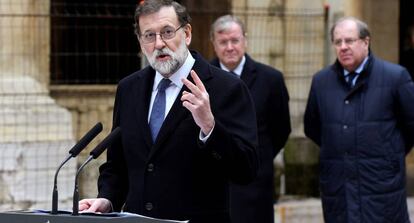Persisting budget impasse forces Madrid to consider Plan B
If all else fails, government could pass a decree by mid-year to get some projects off the ground


The delay in getting the 2018 budget plan approved has been a source of problems for the Spanish government, which says the situation prevents it from raising government employee wages, revising the lowest pension payments, releasing funds for regional spending or green-lighting investment projects.
The plan for now is to get the budget blueprint adopted before March 31
Despite a better-than-expected economic environment, storm clouds continue to hover over the political scene as Madrid struggles to secure support for its spending bill. The Mariano Rajoy administration is facing a mounting set of problems ranging from the fallout from corruption cases to the ongoing Catalan crisis, and now it looks like some opposition parties may be deliberately holding back support on the 2018 accounts.
Ciudadanos is a case in point. After reaching a preliminary deal with the PP late last year, the reform party is now making new demands on the executive. Its leader Albert Rivera has warned that Ciudadanos will not back the budget plan unless PP Senator Pilar Barreiro, who is under investigation in the Púnica corruption case, steps down from her post.
“We will not go ahead if the PP does not remove the senator. It is important for the PP to honor its pledges,” said José Manuel Villegas, secretary general of Ciudadanos, alluding to promises of anti-corruption measures.
But the government feels that Ciudadanos is simply flexing its muscles following its recent victory at the Catalan elections of December 21, where it was the single most-voted party. Recent opinion polls also suggest that if general elections were held now in Spain, Ciudadanos would come in first.
The government feels that Ciudadanos is flexing its muscles following its recent victory at the Catalan elections
Meanwhile the Basque Nationalist Party (PNV), which has sporadically backed the government on specific issues in the past, is not budging on this one. In recent months the party has warned that there will be no deal as long as Catalonia remains under central control.
“The PNV will not negotiate until Catalonia has legitimate and legitimized institutions,” said party president Andoni Ortuzar in December, referring to the application of Article 155 of the Spanish Constitution. But the situation in Catalonia is far from clear following a snap election that yielded another separatist majority in the regional parliament, and an upcoming vote to choose the next Catalan premier that could yield a number of unprecedented scenarios.
The government has set a deadline: March 31. Anything later than that means that the budget would only be in effect for four or five months, with the summer recess in between.
“Last year we approved the budget on March 31, and it was passed by parliament in late June. Ideally it should be earlier this year,” said Rajoy last week.
Just in case, Finance Minister Cristóbal Montoro is bracing for a year without an approved spending plan. If the government fails to secure enough support to ensure passage, Montoro believes that the economy can still grow on automatic pilot.
Good prospects
Against the forecasts of most financial analysts, the Spanish economy is not slowing down. Catalonia is recovering from a troubled last quarter marked by the secessionist challenge, and is topping the growth charts once again. And the news coming out of Europe talk about the best economic data in a decade.
It would also be possible to pass a decree toward the middle of the year to resolve a few pending matters such as government employee pay raises, funding for gender violence plans or tax cuts that have already been negotiated with Ciudadanos. Madrid could also activate mechanisms to ensure that regional governments are not negatively affected by the delay.
This strategy would be like kicking the ball forwards and postponing the problem for another year. But 2019 is an election year at the local, regional and European levels, which will bring its own set of issues as parties go into campaign mode.
The plan for now is to get the budget blueprint adopted before March 31, but if the impasse persists, Rajoy will consider that the talks are over, and he will begin work on the 2019 accounts by drafting a spending ceiling and defining the public debt and deficit targets as mandated by Brussels. The 2019 budget plan should be ready by September.
English version by Susana Urra.
Tu suscripción se está usando en otro dispositivo
¿Quieres añadir otro usuario a tu suscripción?
Si continúas leyendo en este dispositivo, no se podrá leer en el otro.
FlechaTu suscripción se está usando en otro dispositivo y solo puedes acceder a EL PAÍS desde un dispositivo a la vez.
Si quieres compartir tu cuenta, cambia tu suscripción a la modalidad Premium, así podrás añadir otro usuario. Cada uno accederá con su propia cuenta de email, lo que os permitirá personalizar vuestra experiencia en EL PAÍS.
¿Tienes una suscripción de empresa? Accede aquí para contratar más cuentas.
En el caso de no saber quién está usando tu cuenta, te recomendamos cambiar tu contraseña aquí.
Si decides continuar compartiendo tu cuenta, este mensaje se mostrará en tu dispositivo y en el de la otra persona que está usando tu cuenta de forma indefinida, afectando a tu experiencia de lectura. Puedes consultar aquí los términos y condiciones de la suscripción digital.








































